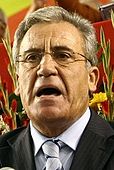2021 Portuguese local elections
This article needs additional citations for verification. (April 2020) |
| |||||||||||||||||
All 308 Portuguese municipalities and 3,092[1] Portuguese Parishes All 2,000 local government councils | |||||||||||||||||
|---|---|---|---|---|---|---|---|---|---|---|---|---|---|---|---|---|---|
| Opinion polls | |||||||||||||||||
| |||||||||||||||||
The Portuguese local election of 2021 will take place on late September or early October of the same year. The election consistes of three separate elections in the 308 Portuguese municipalities, the election for the Municipal Chambers, whose winner is elected mayor, another election for the Municipal Assembly, as well an election for the lower-level Parish Assembly, whose winner is elected parish president. This last will be held separately in the more than 3,000 parishes around the country.
Electoral system
All 308 municipalities are allocated a certain number of councilors to elect corresponding to the number of registered voters in a given municipality. Each party or coalition must present a list of candidates. The lists are closed and the seats in each municipality are apportioned according to the D'Hondt method. Unlike in national legislative elections, independent lists are allowed to run.
Council seats and Parish assembly seats are distributed as follows:
| Councilors | Parish Assembly | ||
|---|---|---|---|
| Seats | Voters | Seats | Voters |
| 17 | only Lisbon | 21 | more than 40,000 voters |
| 13 | only Porto | 19 | more than 20,000 voters |
| 11 | 100,000 voters or more | 13 | more than 5,000 voters |
| 9 | more than 50,000 voters | 9 | more than 1,000 voters |
| 7 | more than 10,000 voters | 7 | 1,000 voters or less |
| 5 | 10,000 voters or less | ||
- For parishes with more than 30,000 voters, the number of seats mentioned above is increased in one per 10,000 voters beyond that number (if, by applying this rule the result is even, the number of seats is increased in one more.
Parties
The main political forces that will be involved in the election are:
- Liberal Initiative (IL)
- Left Bloc (BE)
- People's Party (CDS–PP) (only in some municipalities)1
- Unitary Democratic Coalition (CDU)
- Together for the People (JPP)
- LIVRE (L)
- People–Animals–Nature (PAN)
- Socialist Party (PS)
- Social Democratic Party (PSD) (only in some municipalities)1
1 The PSD and the CDS–PP are expected to form coalitions in several municipalities between them and with some smaller center-right/right-wing parties like the Earth Party (MPT) and the People's Monarchist Party (PPM).[3]
Opinion polls
See also
References
- ^ DGAI - Reorganização Administrativa do Território das Freguesias - (RATF)
- ^ "Lei Eleitoral dos Orgãos das Autarquias Locais" (PDF). Comissão Nacional de Eleições (in Portuguese): 110. 2014.
- ^ https://observador.pt/2021/01/27/psd-e-cds-deixam-chega-fora-de-acordo-autarquico-cds-mantem-porta-aberta-a-ventura-apos-legislativas/



